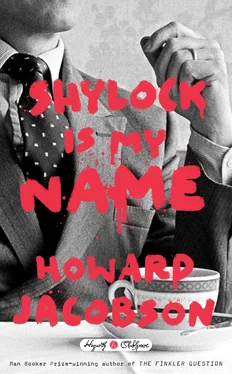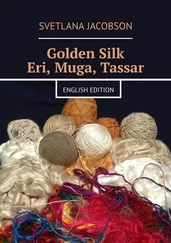So it was with reluctance that he picked out this and that on Strulovitch’s walls. A small Mark Gertler nude, roseate and pert, a Christian body offered to a Jew’s curiosity, but kept just beyond his grasp. Some Bomberg charcoal sketches of war-damaged English churches. A couple of early Lucian Freuds which must still have been worth a pretty penny, cruel-eyed and unforgiving, but showing no Jewish sensibility to Shylock’s sense, the painter, if anything, hobnobbing Freudianly with the English. If these were Jewish painters they were at pains to please Gentile critics.
More to his taste was a trio of densely worked portraits by Frank Auerbach which rendered, in a way that made him marvel, what it is to be inside the knotted matrix of a head, or at least, he thought grimly, clenching his teeth, what it is to be inside mine.
He couldn’t decide what to make of Strulovitch’s collection — not just the individual works but the fact of Strulovitch’s wanting to own them. By religion as well as forced habit he was a word man. Sensual representation worried him. God had spoken the world into existence—“Let it be”—he had not painted it. Had God been a painter the world would have been other than it is. Better or worse? Well, less disputatious and declamatory, which might not have suited Shylock. Would he have known himself in a painted world? He thought in words, argued in words, stood his ground in words. On the other hand he had loved Leah from the moment he set eyes on her, loved the fleshliness of her, loved the atmosphere of her, loved her sleeping no less than waking, loved the silent being of her. When she died their relationship dwindled into talk— dwindled not because the talk was trivial but because talk now became all there was, an unending conversation he could not survive without, but still he misses her beyond bearing, so what he’s lost cannot be her words but the look and smell and feel of her. It is a sacrilege to her to call himself a man of words only.
And it is a sacrilege to him, too, a sacrilege promoted assiduously by the Gentiles. The Jews were a people without sensuous appreciation, they insisted. What they saw they saw second-hand, through the eyes of others. Their natural medium was the law and the law enshrined itself in words. So by words were they made intransigent and cruel. And blind. That was the libel. And Jews — remarkably for an obstinate people (another libel) — acquiesced in it. Yes, you are right, they had told the Gentiles, we are bound by the cold formality of the word and leave all that’s lovely in life to you. We think, and leave you to see. We judge, and leave you to enjoy. Lies, all of it. The word that created the world also created its physical delights. Let there be sea, let there be sky, let there be light, let there be beauty.
The God of the Jews, too, had not made enough of his sensuous side, not wanting to be confused with pagan idols.
Strulovitch, at least in his collecting, had refused the example of the over-particular Jewish God and refuted the libels of the Gentiles.
Shylock wandered between the paintings again, taking his time, noticing a group of portraits by Emmanuel Levy he had missed before, all of anxious and watchful-looking women, painted in a soft and melancholy manner, sensuous without being voluptuous, expressing a sort of love, he thought, whatever the painter’s actual relations to them. And two more, equally fond but if anything more fraught, by Bernard Meninsky. Many of the paintings in Strulovitch’s collection, he began to notice, expressed this keen, compassionate apprehension of the strain of being a woman. Jewish women were they? Burdened with loving Jewish men? He didn’t know, but under their influence he began to relax his initial hostility, liking everything he saw more, this time round, for Leah’s fleshly sake. It was as though he were using faculties he hadn’t known he possessed. If he’d bought Jessica paintings for her room — what then? Could he have kept her by beautifying her surroundings?
Yet why, in that case, hadn’t it worked for Strulovitch? Here was beauty everywhere you looked, but where was Beatrice?
He thought he knew the answer: Strulovitch refused the libel with one part of his mind but accepted it with another. He hung what was forgetfully sensual on his walls and still went on being a man of words, arguing with everyone around him. The art he bought, he bought in order to gain entrance to a world which in his heart he didn’t think by right was his. But he was wrong. He should look at what he owned more, Shylock thought. More often, more intensely, and with more pride. He should drink it in. Revel in it. It was his as much as it was theirs. He hadn’t become one of them by buying art, he had become himself.
Never mind what God had said about graven images. There was another reading of that injunction. It was God, the great separater, keeping ordinance and beauty, religion and art, apart from each other. It was Jewish to obey the law. And it was Jewish to love colour, vitality and gentleness, as he had loved Leah, as he would still love Leah if only he could see her. Or as Jessica, in her desperation, had loved not him.
What wasn’t Jewish was to love both at the same time.
—
“What news,” meanwhile, “from the Rialto?” Strulovitch was asking, and not getting the answer he wanted.
—
After an afternoon of sightseeing in the Campo di Ghetto Nuovo, Beatrice and Gratan walked arm in arm through the rain in the direction of St. Mark’s Square.
“You’ve had your treat, now I’m having mine,” Beatrice laughed.
Gratan didn’t see how an afternoon of sightseeing in the Ghetto could be called a treat for him.
Beatrice sighed and tried not to miss her father.
Once she’d kissed a boy with sunken cheekbones called Feng. A Chinese boy whose family owned three Chinese supermarkets and two Chinese restaurants in Manchester. She’d tried to captivate him with amusing observations not one of which he found funny.
“Laugh, Feng,” she said, but he seemed not to know how.
It was while she was messing with his mouth, trying to turn the corners of it into a smile and force his lips apart, that she ended up kissing him. At which moment her father came out of the house and accused her of letting Hitler win.
Feng laughed.
So instead of missing her father she decided to miss Feng.
She wondered if there was anyone she didn’t miss, anyone who wouldn’t have been more fun to be with in Venice than Gratan.
“Nobody knows me in this town,” he kept complaining. “I haven’t signed a single autograph.”
“Think of that as a good thing,” she told him. “It means you can concentrate on me.”
They took a seat at Florian’s and listened to the orchestra play. She loved it here. When she’d sat here in the past with her father he’d told her it reminded him of a Viennese café, only outdoors — the best place for being Jewish that had ever been invented. Then Hitler came along and screwed it. “That’s why,” he’d begun…She didn’t bother listening to the rest. That was why he couldn’t let her kiss Feng. But she had felt at one with him here, he pretending to be a Viennese Jew, she pretending to be a good daughter.
It was no place to be with Gratan. “I don’t like this sort of music,” he said. “It’s too sweet. It makes me miserable.”
“It’s meant to make you miserable. Sweetly miserable.”
“It makes me angry miserable.”
“That’s because you’re thinking of something else.”
“Too right I am. I’m thinking of your father castrating me.”
“Just try listening.”
“I don’t like the violins. They sound like sawing.”
She didn’t ask him what music he did like. She knew. Johnny Cash. Bruce Springsteen. Chain-gang music.
Читать дальше












